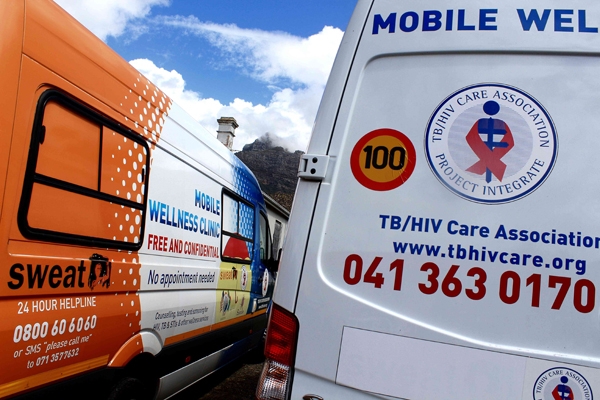

Organisations like SWEAT and TB/HIV Care Association work together to ensure that sex workers get respectful, dignified health services. Photo by Masixole Feni.
20 October 2014
Leigh Davids was born a boy, but when she was five, she realised she wanted to be a girl.
“I used to be a little moffie in the coloured community and I had to face that every day,” says Davids, who is now 35.
She lived with her grandparents and they couldn’t accept that she wanted to be a girl. So at 14 she ran away. “It was easy for me to leave the house and not think twice,” she says.
It was on the train journey from home to the city that she met another transgender female who told her, “I’ve got a house. I know you have no money. I know what you’ve been through.” It was through her new friend that she was introduced to sex work.
She recalls that on her first night of sex work she made R520 from three clients. After a year she decided to work for herself.
Davids works as a woman. Sometimes, if a client discovers that she is not female, she has to fight her way out. “I cannot just tell a client, ‘Hey I’m trans!’ He could kill me right then and there, because a lot of people are transphobic.”
“I need to stand in a certain way. I need to walk in a certain way and I cannot lose my pose otherwise the man’s gonna see,” she explains. “At the end of a session I’m not tired from business, I’m tired from the acting.”
Davids is buzzing with energy and animated when she talks. She has worked for SWEAT and Sisonke, two organisations that campaign for sex worker rights. She is aware of her rights, and an outspoken proponent for the decriminalisation of sex work. She is also one of the few sex workers in Cape Town willing to use her real name when speaking to journalists. Davids explains how the fact that sex work is criminalised causes difficulties for her on the street. She encounters abuse, stigma and police harassment.
Leigh Davids, who is a sex worker, gets excellent service from the Ivan Toms clinic in Woodstock.
“I’m shit scared because I’m street based. Even though I know you, even though we have done business for many years, I’m always in a position where you can hurt me as much as you want to,” Davids says of her clients.
Davids tested positive for HIV in May 2009. Before that she used to get tested every six months.
She is on antiretroviral treatment that she receives from the Ivan Toms Clinic in Woodstock, a public clinic run by Health4Men. This health facility specialises in providing friendly care to sex-workers and gay men, though anyone is welcome. “They know my pain, they know how lesbian, gay and transexual people get stigmatised in hospitals,” says Davids.
Antiretroviral treatment usually suppresses the HIV in blood, semen and bodily fluids, in which case the virus cannot be transmitted. By being on antiretroviral treatment, there is almost no chance that Davids will transmit HIV to her clients.
Davids says she would not set foot in a hospital or clinic that was not sensitised to the needs and rights of sex workers. “How do you go into a space where people stigmatise you? You don’t feel happy being there.”
Ursula Poggenpoel-Smith is the Project Coordinator for the Sex Work Programme for an organisation called TB/HIV Care Association. She says when health workers have not been sensitised to work with sex workers, it is difficult for sex workers to tell their consultants the truth, which often results in them not receiving the correct treatment.
TB/HIV Care provides health-care services to sex workers, such as HIV counselling and testing, and screening for tuberculosis and sexually transmitted infections. The organisation runs a clinic next to the offices of SWEAT in Observatory, as well as mobile clinics on the streets.
Her good experiences with Health4Men and TB/HIV Care have helped Davids deal with her HIV. “Other sex workers see with me that it’s not the end of the world. There’s life after this. There’s so much more,” says Leigh.
SWEAT is campaigning for sex work to be decriminalised in South Africa by 2016. “We want full decriminalisation, which basically means that sex workers will choose how they want to work, where they want to work and will get full protection from government,” explains SWEAT media advocacy officer Lesego Tlhwale.
One of the key arguments for decriminalisation is that it will make it easier for sex workers to access health care. If sex work is no longer illegal, it will be easier for sex workers to be more open and to get health care so that they can protect themselves and reduce the risk of passing sexually transmitted infections to their clients.